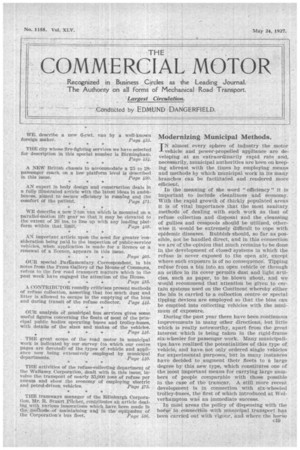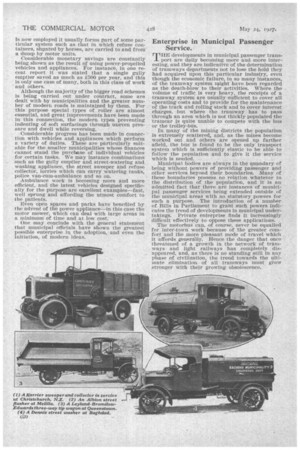Modernizing Municipal Methods.
Page 77

Page 78

If you've noticed an error in this article please click here to report it so we can fix it.
TN almost every sphere of industry the Inciter -I-vehicle and power-propelled appliance are developing at an extraordinarily rapid rate and, necessarily, municipal authorities are keen on keeping abreast with the times by employing means and methods by which municipal work in its many branches can be facilitated and rendered more efficient.
In the meaning of the word " efficiency " it is important to include cleanliness and economy. With the rapid growth of thickly populated areas it is of vital importance that the most sanitary methods of dealing with such work as that of refuse collection and disposal and the cleansing of gullies and cesspools should be utilized, otherwise it would be extremely difficult to cope with epidemic diseases. Rubbish should, so far as possible, not be handled direct, and in this connection we are of the opinion that much remains to be done in the development of closed systems in which the refuse is never exposed to the open air, except where such exposure is of no consequence'. Tipping refuse from a bin into an open vehicle or through an orifice in its cover permits dust and light articles, such as paper, to be blown about, and we would recommend that attention be given to certain systems used on the Continent whereby either the bin is carried to a collection centre or special tipping devices are employed so that the bins can be emptied into collecting vehicles with the minimum of exposure.
During the past year there have been continuous improvements in many other directions, but little which is really noteworthy, apart from the great interest which is being taken in the rigid-frame six-wheeler for passenger work. Many municipalities have realized the potentialities of this type of vehicle, and have, not only ordered single vehicles for experimental purposes, but in many instances have decided to ,augment their fleets to a large degree by this new type, which constitutes one of the most important means for carrying large numbers of people comparable with those possible in the case of the tramcar. A still more recent development is in connection with six-wheeled trolley-buses, the first of which introduced at Wolverhampton wai an immediate success.
In most areas the policy of dispensing with the horse in connection with municipal ti a ns,po rt has been carried out With VigOili", án a *here the horSe c19
is now employed it usually forms part of some particular system such as that in which refuse containers, shunted by horses, are carried to and from a dump by motor units.
Considerable monetary savings are constantly being shown as the result of using power-propelled vehicles and appliances. For instance, in one recent report it was stated that a single gully emptier saved as much as f.500 per year, and this is only one case of many, both in this class of work and others.
Although the majority of the bigger road Schemes is being carried out under contract, some are dealt with by municipalities and the greater number of modern roads is maintained by them. For this purpose special types of roller are almost essential, and great improvements have been made in this connection, the modern types preventing Indenting of soft surfacings through uneven pressure and dwell while reversing.
Considerable progress has been made in connection with vehicles and appliances which perform a variety of duties. These are particularly suitable for the .smaller municipalities whose finances cannot stand the purchase of individual vehicles for certain tasks, We may instance combinations such as the gully emptier and street-watering and Washing appliance, the street sweeper and refuse collector, lorries which can carry watering tanks, police van-cum-ambulance and so on.
Ambulance work is becoming more and more efficient, and the latest vehicles designed specifically for the purpose are excellent examples—fast, well sprung and affording the utmost comfort to the patients.
Even open spaces and parks have benefited by the advent of the power applianCe2-4n this case the motor mower, which can deal with large areas in a minimum of time and at low cost.
One may _conclude with the general statement that municipal officials have shown the greatest possible enterprise in the adoption, and even the Initiation, of modern ideas.
Enterprise in Municipal Passenger • Service.
rrIIE developments in municipal passenger trans1 port are daily becoming more and more interesting, and they are indicative of the determination of tramways departments not to lose the hold they had acquired upon this particular industry, eveit though the economic failure, in so many instances, of the tramway system might have been regarded as the death-blow-to their activities. Where the volume of traffic is very heavy, the receipts of a tramway system' are usually sufficient to cover all operating costs and to provide for the maintenance of the track and rolling stock and to cover interest charges, but where the tramway has to pass through an area which is not thickly populated the tramcar is quite unable to compete with the bus or the trolley-bus. In many, of the mining districts the population Is extremely •scattered, and, as the mines become worked out and others are opened up. farther afield, the bus is found to be the only' transport system which is sufficiently, elastic to be able to follow the population and to give it the service which is needed.
Municipal bodies are always in the quandary of being without powers of providing passenger and other services beyond thelr. boundaries. Many of these boundaries possess no relation whatever to the distribution of the population, and it is an admitted fact that there are instances of municipal passenger services being extended outside of the municipal areas with no statutory powers for such a purpose. The introduction of a number of Bills in Parliament to grant such powers indicates the trend of developments in municipal undertakings. Private enterprise finds it increasingly difficult effectivelyto oppose these applications.
The motorbus can, of course, never be equalled for'hater-town work • because of the greater comfort and the more pleasant mode of travel which it affords generally. Hence the danger that once threatened of a growth in the network of tramways and light railways has completely disappeared, and, as there is no standing still in any phase of civilization, the trend towards the ultimate elimination of all tramways" must grow stronger with their growing obsolescence. •




















































































































































































